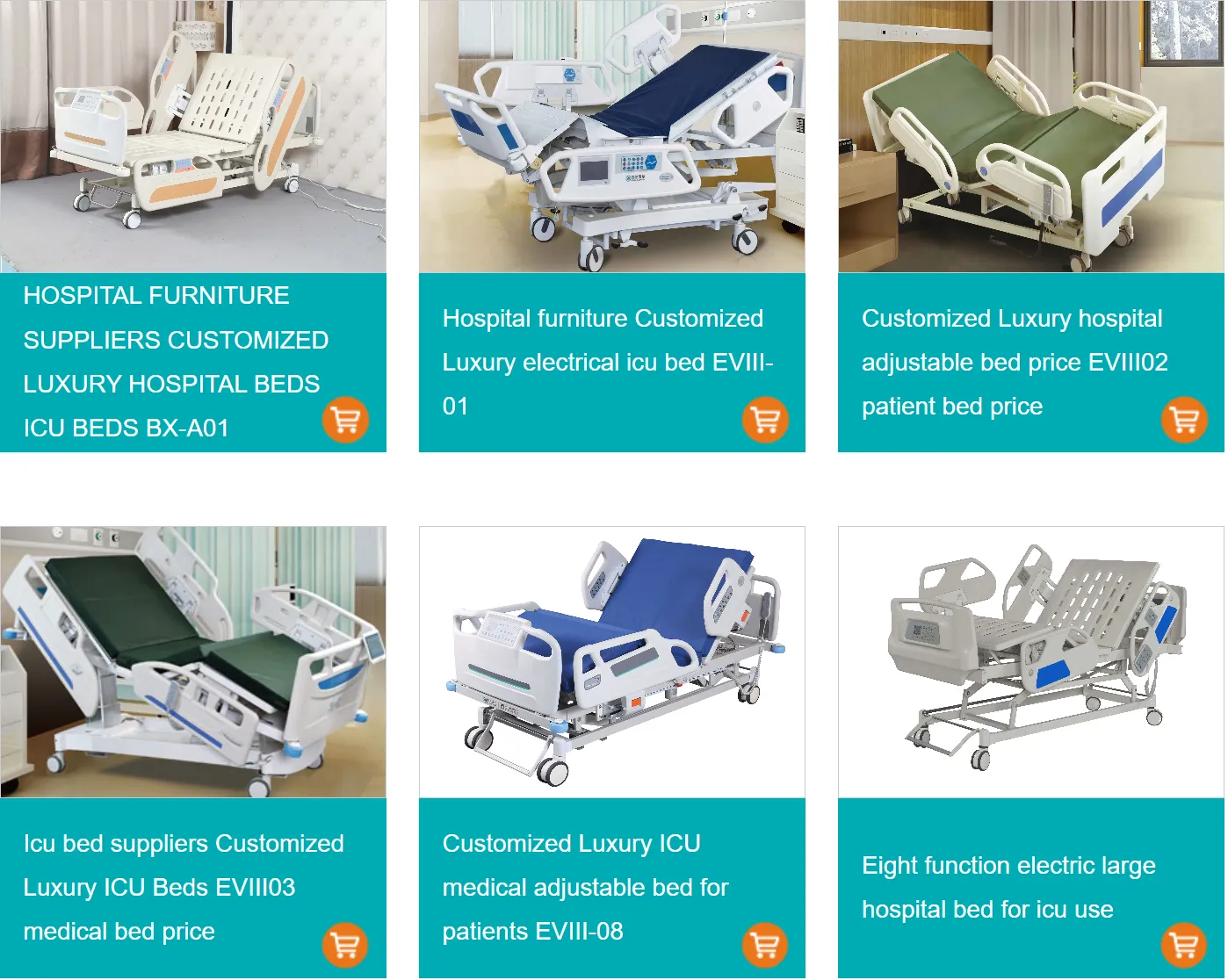Factors Affecting ICU Bed Price
Understanding the variables that influence ICU bed price helps healthcare facilities make informed purchasing decisions. As a leading manufacturer of ICU hospital bed equipment since 2008, BoXin Recovery examines the key factors determining ICU bed cost while maintaining our commitment to quality and affordability.
ICU Bed Price Determinants
- Material quality - Medical-grade metals and components affect ICU hospital bedpricing
• Weight capacity - Bariatric-rated ICU bed cost exceeds standard models
• Certifications - CE, ISO-certified ICU bed price reflects testing/compliance expenses
• Brand reputation - Established ICU hospital bed manufacturers command premium pricing
• Order volume - Bulk purchases typically reduce per-unit ICU bed cost

ICU Hospital Bed Feature Impact
- Motorization - Electric ICU bed price exceeds manual versions
• Specialty functions - CPR, tilt, or rotating features increase ICU hospital bed costs
• Monitoring integration - Beds with built-in ICU bed cost more than basic models
• Mattress technology - Advanced pressure-relief systems elevate ICU bed price
• Accessory packages - Included rails, trays affect final ICU hospital bed quote
ICU Bed Cost Production Factors
- Manufacturing technology - Automated ICU bed pricevs manual production costs
• Component sourcing - Imported parts may increase ICU hospital bed expenses
• Labor costs - Skilled assembly impacts ICU bed cost structure
• Quality control - Rigorous testing procedures factor into ICU bed price
• Customization - Special-order ICU hospital bed configurations carry premium
ICU Bed Price Market Influences
- Regional regulations - Compliance requirements vary ICU hospital bedpricing globally
• Shipping logistics - Transportation affects final ICU bed cost to destination
• Currency fluctuations - International ICU bed price sensitivity to exchange rates
• Demand cycles - Seasonal ICU hospital bed market pressures
• Technology trends - Advanced features becoming standard raise baseline ICU bed cost
ICU Hospital Bed Value Considerations
- Durability - Longer-lasting ICU bed priceamortized over years of service
• Warranty coverage - Comprehensive ICU hospital bed protection plans
• Service life - Quality materials extend ICU bed cost effectiveness
• Energy efficiency - Lower operating ICU bed price long-term
• Upgradability - Modular ICU hospital bed designs future-proof investment
ICU Bed Price FAQs
-
Q: What factors influence the ICU bed price?
A: Several elements impact ICU bed prices, including the hospital’s location, the level of medical equipment available in the room (such as ventilators or advanced monitoring devices), the expertise of the medical staff, and the duration of the patient’s stay. Additionally, whether the hospital is private or public, and local healthcare policies can also affect the cost.
-
Q: How does insurance cover ICU hospital bed expenses?
A: Insurance coverage for ICU hospital beds varies widely. Some plans fully cover the cost, while others may only pay a portion. It depends on the type of insurance policy, deductibles, co-insurance rates, and pre-authorization requirements. Patients should check with their insurance provider to understand the specific terms of coverage for ICU stays.
-
Q: Are ICU bed costs higher in urban areas compared to rural areas?
A: Generally, ICU bed costs tend to be higher in urban areas. Urban hospitals often have more advanced technology, higher staff salaries due to the cost of living, and higher demand for services, all of which contribute to increased expenses. However, this isn't always the case, as some rural hospitals may charge more due to limited competition or specialized services.
-
Q: Can patients negotiate the ICU bed price?
A: In some situations, patients may be able to negotiate the ICU bed price. This is more likely if the patient is uninsured or has high out-of-pocket costs. By discussing payment options, asking for itemized bills, and exploring financial assistance programs offered by the hospital, patients may find room to lower the overall cost.
-
Q: How do ICU hospital bed costs compare between private and public hospitals?
A: ICU hospital bed costs in private hospitals are typically higher than in public hospitals. Private hospitals often invest in luxurious facilities, state-of-the-art equipment, and specialized medical staff, leading to elevated prices. Public hospitals, on the other hand, receive government funding and aim to provide affordable care, resulting in relatively lower costs for ICU services.
Welcome to Hebei Boxin Recovery Equipment Co., Ltd.! www.cnboxin.com Established in 2008, we’ve dedicated over 15 years to crafting premium medical and rehabilitation solutions. Nestled in Hengshui City, Hebei Province, our 40,000㎡ facility combines innovation with reliability. As a leading manufacturer, we specialize in manual/electric hospital beds, home care nursing beds, advanced ICU beds, transfer trolleys, stretchers, medical trolleys, air mattresses, and storage cabinets—all designed to meet diverse healthcare needs.
Committed to quality and patient comfort, our products blend ergonomic design with durable materials, ensuring safety and functionality for hospitals, care centers, and homes. Whether you seek clinical-grade equipment or home healthcare solutions, Boxin’s expertise guarantees excellence. Explore our comprehensive range today and experience how we transform recovery through precision engineering. Your trust drives our mission to redefine healthcare equipment standards worldwide.
-
Advanced Power Hospital Bed: Optimal Comfort & Emergency ReadyNewsAug.30,2025
-
Medical Bed Infection ControlNewsAug.29,2025
-
Gel Mattress for Hospital Bed: Ease of CleaningNewsAug.29,2025
-
Features of Hospital Recliner ChairNewsAug.29,2025
-
Benefits of a Three Function BedNewsAug.29,2025
-
Bed Care in Nursing: Patient ComfortNewsAug.29,2025
-
Adjustable Over Bed Table: Height & Angle for Versatile UseNewsAug.29,2025











